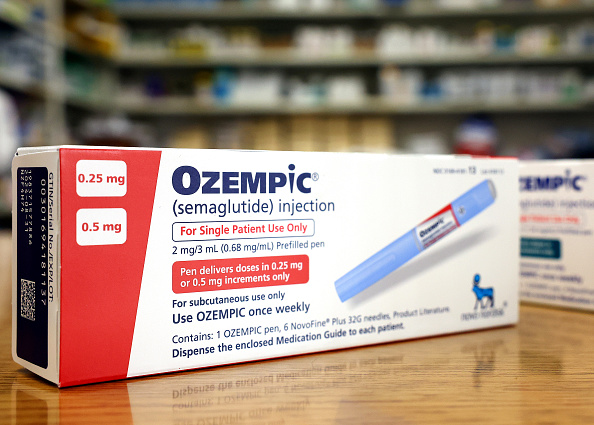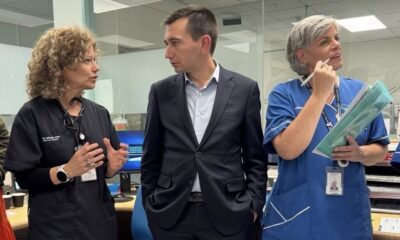Health
New Diabetes Treatments Show Promise for Young Patients

November marks Diabetes Action Month, highlighting an alarming trend: an increasing number of young people are being diagnosed with type 2 diabetes. According to Diabetes NZ, this surge could lead to a significant health crisis if not addressed promptly.
Dr. Craig Jefferies, a paediatric endocrinologist at Auckland’s Starship Children’s Hospital, shared insights on a recent trial during an interview with RNZ’s Morning Report. He indicated that new weight loss and diabetes medications show “very, very promising” results. Although these treatments are not currently funded by the government, Dr. Jefferies emphasized their potential to be “life-changing” for young patients.
“The most recent trial indicates they are very effective with a low side-effect profile. While they are expensive, we are only dealing with a small number of youth with type 2 diabetes, so the overall cost to Pharmac would not be substantial,” Dr. Jefferies explained. He noted that type 2 diabetes can be particularly aggressive in children and teenagers, leading to severe complications much earlier compared to adults.
Dr. Jefferies highlighted the increased risk of serious health issues such as blindness, amputations, kidney failure, and heart disease in younger populations. “If left undiagnosed and unsupported, the outcomes can be devastating,” he warned.
Research indicates that young individuals are more susceptible to type 2 diabetes if they belong to Māori, Pasifika, or Asian descent backgrounds, or if their mothers had diabetes during pregnancy. “For young people, type 2 diabetes is not just a lifestyle disease; it is influenced by complex genetic, social, and environmental factors beyond their control,” Dr. Jefferies noted, while acknowledging that weight is also a contributing factor.
Historically, type 2 diabetes was rare among young people, which meant it was often overlooked by general practitioners. Today, however, symptoms such as excessive thirst, frequent urination, extreme fatigue, and unexplained weight loss must lead to diabetes being considered in diagnoses. Early detection is essential to prevent severe complications.
Heather Verry, chief executive of Diabetes NZ, pointed out that although a majority of the estimated 6,000 diabetes cases in individuals under 25 are type 1, the rise in type 2 cases serves as a critical warning for policymakers. “We cannot afford to wait until the numbers become overwhelming. The time to act is now to implement prevention, education, and support for these valued members of our community,” Verry stated.
Currently, there are no tailored programmes or resources specifically for young people living with type 2 diabetes. Verry emphasized the need for age-appropriate, practical education that is non-judgmental and addresses mental health, thereby reducing stigma. “These children deserve the chance to thrive,” she concluded.
With diabetes rates climbing among the youth, immediate action is essential to develop comprehensive strategies that can effectively manage and prevent this condition, ensuring a healthier future for the next generation.
-

 Sports2 months ago
Sports2 months agoNetball New Zealand Stands Down Dame Noeline Taurua for Series
-

 Entertainment2 months ago
Entertainment2 months agoTributes Pour In for Lachlan Rofe, Reality Star, Dead at 47
-

 Entertainment4 weeks ago
Entertainment4 weeks agoNew ‘Maverick’ Chaser Joins Beat the Chasers Season Finale
-

 Sports2 months ago
Sports2 months agoSilver Ferns Legend Laura Langman Criticizes Team’s Attitude
-

 Sports3 days ago
Sports3 days agoEli Katoa Rushed to Hospital After Sideline Incident During Match
-

 Politics1 month ago
Politics1 month agoNetball NZ Calls for Respect Amid Dame Taurua’s Standoff
-

 Entertainment2 months ago
Entertainment2 months agoKhloe Kardashian Embraces Innovative Stem Cell Therapy in Mexico
-

 World3 months ago
World3 months agoPolice Arrest Multiple Individuals During Funeral for Zain Taikato-Fox
-

 Sports3 months ago
Sports3 months agoGaël Monfils Set to Defend ASB Classic Title in January 2026
-

 Entertainment1 month ago
Entertainment1 month agoTyson Fury’s Daughter Venezuela Gets Engaged at Birthday Bash
-

 Sports1 month ago
Sports1 month agoHeather McMahan Steps Down as Ryder Cup Host After Controversy
-

 World2 weeks ago
World2 weeks agoSevere Winds Hit New Zealand, Over 100 Flights Canceled




















